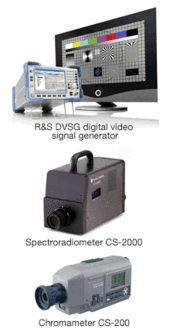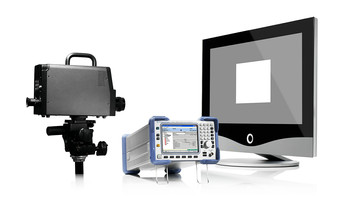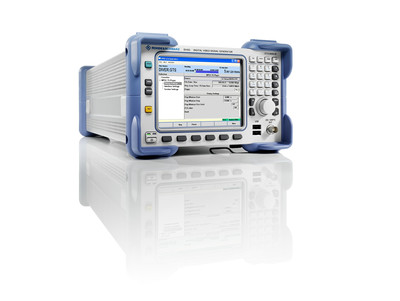Rohde & Schwarz GmbH & Co. KG
Flexible measurement of light density and chromaticity coordinates on flat screens (FPD TV) – fast and easy analysis options
For more than 75 years, the name of Rohde & Schwarz GmbH & Co. KG has been synonymous with the highest quality in electronics and measurement technology ‘Made in Germany’. The company was founded, and for a long time also managed by, the two physicists, Dr Lothar Rohde and Dr Hermann Schwarz, who first met during their studies in Jena. The company had its early beginnings as a physical-technical development laboratory. It grew to become one of the world’s leading companies in the fields of measurement technology, wireless, safe communications, and monitoring and direction-finding technology. Today, Rohde & Schwarz employs 7,400 people in more than 70 countries around the world, and generated 1.4 billion euros in the financial year 2008/2009 (July to July). In spite of its strong international focus, Rohde & Schwarz’s research activity continues to be concentrated in Germany. Numerous telecommunications services, such as the worldwide use of GSM, would not have been conceivable without the Munich company’s inventiveness.
Rohde & Schwarz relies on products from Konica Minolta Sensing in its important wireless measurement technology division. This division mainly uses spectroradiometers from the CS range. As a result of their versatility, measurement accuracy and operating convenience, these ideally complement Rohde & Schwarz video signal generators such as the R&S DVSG.
A good signal for better brilliance and definition
Rohde & Schwarz has been involved in the field of wireless broadcasting for more than 50 years. Today, the company has established itself as market leader with a complete range of transmitting and measurement equipment for operators and industry. In a measuring scenario which is still common today, a video signal generator produces a reference signal which is in turn received and measured by a second unit. Here, a simple variance comparison determines whether or not a monitor, TV transmitter, receiver, etc. satisfies the quality criteria. At the beginning of the wireless age, a test image was generated by a cathode ray tube and in turn recorded by a camera. With its various graphical details, this soon exposed the weaknesses of a TV set. It was certainly an expedient move by Rohde & Schwarz when later different test images could effectively be called up electronically, one at a time, at the press of a button. Although this improved the accuracy and speed of measurement, there was essentially little change in the way in which the measurements were taken until the beginning of the 1990s. This is because the actual technology behind analogue broadcasting had hardly changed since the first half of the last century.

Quality leap through digitalisation
The quality leap from the analogue into the digital television, computer monitor and display world has forced digital input data to be adapted to suit the high and increased expectations of its users and its changed user profiles. Just as 50 years later, Rohde & Schwarz is a world leader. It supplies manufacturers as well as television companies and network operators with operating and measurement equipment around the globe. The majority of the world’s latest “TV everywhere” transmission systems with DVB-TV originate from the Rohde & Schwarz development laboratory. Rohde & Schwarz also works side-by-side with renowned consumer electronics manufacturers. Video generators, such as the R&S DVSG, are used in the manufacture and quality assurance of monitors and displays. Since the 1980s, significant changes, which have encompassed all criteria of image reproduction, have also taken place here under the influence of the computer industry. Completely new requirements have been imposed on the equipment and measuring methods. With its video generators, Rohde & Schwarz is a pioneer in this field, as it was half a century ago. This naturally also applies to the ease of operation of the innovative R&S DVSG video signal generator.
Wireless technology from Bavaria for the world
It is therefore not without pride that Harald Gsödl, Product Manager for Wireless Measuring Technology at Rohde & Schwarz in Munich, talks about the comprehensive range of services offered by the traditional Munich company. “Rohde & Schwarz has been a leader in high-frequency technology for many years. This applies particularly to our company’s many measurement products which have set new standards in the industry. Our customers in turn have been able to raise the bar with their products, thanks to our measurement technology. This is because their production and quality assurance are based on our equipment, regardless of whether it be all-round instruments for electricians, system solutions for quality assurance and production, or solutions for special applications such as video signal generators.”
Rohde & Schwarz video signal generators can therefore be found in many development and QA laboratories as well as TV manufacturers’ production facilities on all continents. Here they are used for testing the image reproduction characteristics of the latest products and for monitoring production itself. An important quality criterion of display units is unadulterated image rendition with uniform and reproducible light and colour values. In this regard, Rohde & Schwarz has placed its trust in spectroradiometers from Konica Minolta Sensing as a counterpart to its video signal generators. “Our customers around the world predominantly use the CS-2000 and its smaller brother, the CS-200, from Konica Minolta Sensing. They are the perfect complement to our R&S DVSG digital video signal generator,” says Gsödl.

Intuitive user interface
The starting point is the familiar Microsoft interface. This is because the R&S DVSG has a Windows Embedded operating system. It is convenient, easy and intuitive to use. As well as the usual functions, this interface enables the measuring instrument application to easily and quickly call up test images according to different display test standards from EBU, ISO, SMPTE, etc. These are then output to the TV under test. “This is where the Konica Minolta Sensing spectroradiometers come into play. They measure the colour saturation and light density values (chromaticity, luminance) of the screen from a defined distance and at a specific angle. This is particularly important with the new flat screen TVs with LCD, plasma or OLED panels. These differ from conventional CRT screens with regard to their viewing angle dependency and a modified reproduction behaviour,” explains the Rohde & Schwarz Product Manager. Although the new panels are more versatile and lighter than the thicker and heavier CRTs, because of the system they have difficulty with the viewing angle dependency. The consequence of this is considerable deviation in colour temperature and also light density. In spite of these restrictions, the change to new screen technologies is inescapable. Today, about 17 million households in Germany already have at least one HD television. Wireless operators which are subject to public law and also their private counterparts are responding to this, and in future will be broadcasting their programmes in high-resolution format.

CS-S10 W: perfect workflow for more measuring convenience
HDTHDTV is presenting the industry with new challenges. A common television signal workflow must be ensured in order to guarantee picture quality from the camera to the studio monitors and to the TV consumers’ entertainment landscape. With its R&S DVSG digital video signal generator, Rohde & Schwarz provides a convenient solution for investigating critical components in the signal flow. The video signal generator produces compressed and uncompressed video and audio signals with different image refresh rates and resolutions, and transmits them for measurement on the screens under test.
Global organisation: service and support close to the customer
For this reason, a measuring set-up consisting of the Rohde & Schwarz DVSG digital video signal generator and a Konica Minolta CS-200 or CS-2000 spectroradiometer can be found in development labs and production facilities for TV sets as well as in studios. A fully automated workflow is possible when supplemented by the Konica Minolta CS-S10W software, which can be installed and operated directly on the R&S DVSG. It is such all-in-one solutions which impress customers worldwide. “It is important for us to work with a partner which has the same sort of global set-up as we have. This means not only collaborating with a strong brand in the target market, but also with a technologically strong partner like Konica Minolta to enable us to call upon their worldwide service and support structures,” says the Rohde & Schwarz Product Manager, explaining the thinking behind this decision.

Rohde & Schwarz GmbH & Co.KG
Geschäftstelle München
Mühldorfstr. 15
81671 München


